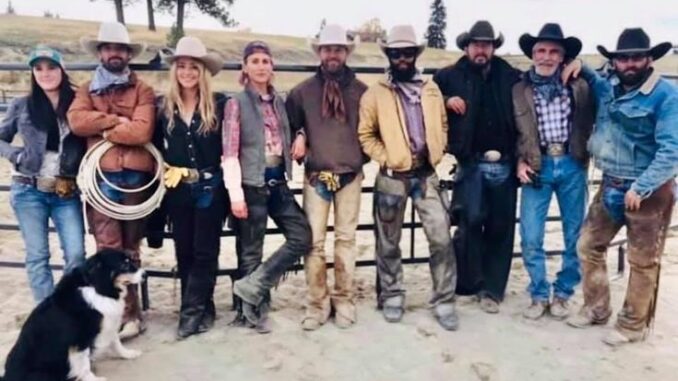
The Unburdened Horizon: What “Easiest to Film” Reveals About the Yellowstone Frontier
Luke Grimes’s seemingly innocuous comment – that the season without Kevin Costner was “the easiest to film” – might initially sound like a piece of backstage gossip, a veiled jab at a departing star. Yet, beneath its surface, this observation offers a profound illustration of the complex dynamics at play in any collaborative, high-stakes creative endeavor. It speaks not merely to personal friction, but to the intricate dance between individual brilliance, ensemble synergy, and the often-unseen weight of leadership that shapes the very atmosphere of a production.
Kevin Costner, as John Dutton, was the undisputed patriarch of Yellowstone, the immovable object around which the entire dramatic universe revolved. His presence carried not just the gravitas of an Oscar-winning actor, but the narrative heft of a character who was the architect of its vast, embattled landscape. Such a central figure naturally casts a long shadow. Logistically, his schedule would have been the North Star guiding the production calendar, demanding careful orchestration of every scene and location. Creatively, his character’s arc often dictated the flow for others, making him a gravitational pull for every storyline. This is not a criticism, but an inherent reality of working with a leading actor of that stature – the set itself becomes an extension of their demanding narrative presence.
So, when Grimes, portraying the conflicted Kayce Dutton, describes a season without this central pillar as “easiest to film,” he likely refers to a palpable shift in the operational rhythm. “Ease” in a film production context rarely means a lack of hard work or creative challenge. Instead, it often signifies the absence of friction, the smoothing of logistical bumps, and a more fluid, perhaps even democratic, decision-making process. Imagine a ship sailing with a single, colossal mast, its every movement dependent on the wind catching that one sail. Now imagine that mast removed, allowing a more even distribution of sails, a more direct path, and perhaps, a greater collective sense of steering.
Without the singular focus on John Dutton’s narrative and Costner’s schedule, the ensemble, including Grimes, Kelly Reilly, Cole Hauser, and Kelsey Asbille, would have found themselves in uncharted waters, yet perhaps unburdened. This could translate to:
- Smoother Scheduling: Fewer delays, less intricate planning around one star’s availability, allowing for a more consistent and predictable workday for the entire crew and cast.
- Enhanced Ensemble Collaboration: With the “sun” no longer dictating every orbit, other “planets” might find their light shining brighter and their movements more autonomous. Actors might have had more direct input, more collaborative scene work, and a sense of shared ownership over the narrative direction. The chorus, rather than solely supporting the lead, found its full voice.
- Reduced Logistical Complexity: High-profile stars often come with specific demands regarding travel, accommodation, and set environment. The absence of these, while understandable for a star of Costner’s caliber, would undoubtedly simplify the sprawling logistical behemoth that is a Yellowstone production.
- A Shift in On-Set Atmosphere: While Costner is respected, the sheer weight of his presence might have inadvertently created a more formal, high-pressure environment. His absence could have fostered a more relaxed, perhaps even playful, atmosphere where camaraderie blossomed more freely, and creative risks felt less daunting. It’s the difference between performing for a stern conductor and jamming with a close-knit band.
Ultimately, Grimes’s comment is not a slight against Costner’s talent or contribution. It is, rather, an illustrative snapshot of how the removal of a dominant force can, paradoxically, unburden and empower the collective. It highlights that the “easiest” path to creative success is not necessarily the one devoid of challenge, but the one free from unnecessary logistical or interpersonal friction. In the untamed frontier of Yellowstone, the absence of the formidable patriarch, while narratively significant, appears to have cleared the skies, allowing the remaining figures to navigate the dramatic landscape with a newly found, almost serene, collective stride. The show, like its characters, has had to adapt, revealing that sometimes, the true strength of a narrative lies not in its sole leader, but in the harmonious, unburdened synergy of its entire, evolving family.
